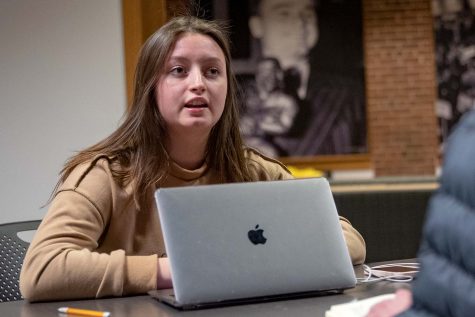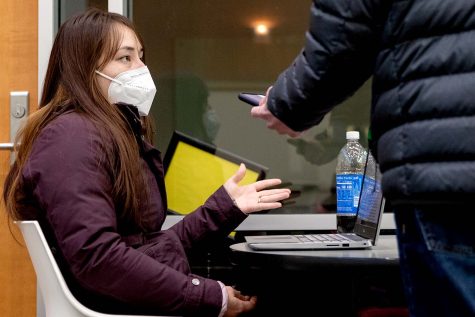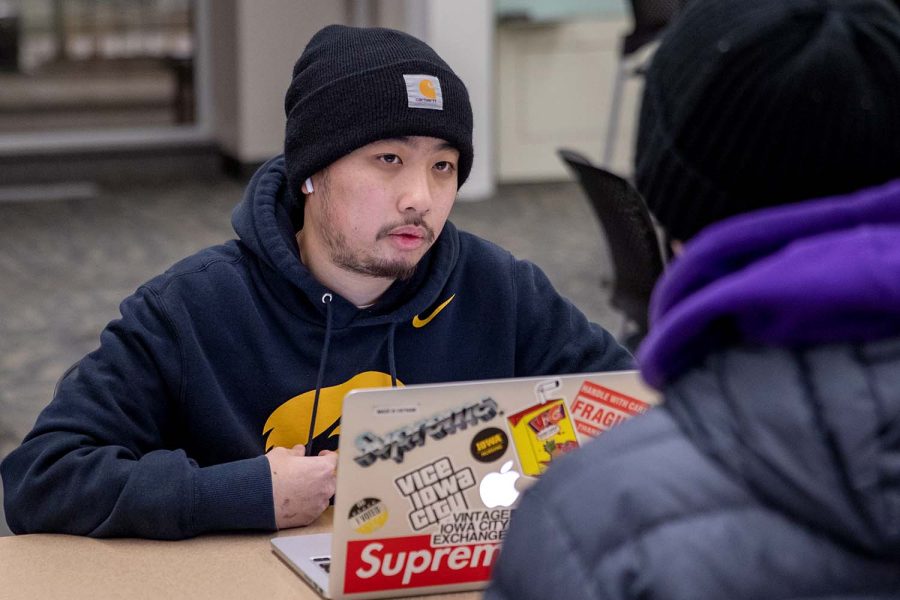Students weigh in on COVID-19 protocols
Despite disputes about the handling of COVID-19, one thing many University of Iowa students agreed on is that they want classes to stay mostly offline this semester.
Fourth-year nursing student Tony Nguyen answers questions during a Daily Iowan interview at the University of Iowa Main Library on Jan. 25, 2022. Nguyen shares his perspective on vaccine mandates. “I think it should be heavily encouraged and pushed that people get vaccinated, but at the end of the day, I think it’s the students’ choice if they want to get vaccinated or not.”
January 30, 2022
Despite differing opinions surrounding the University of Iowa’s handling of COVID-19, one thing several students can agree on is that they want classes to stay in person this semester.
The Daily Iowan talked to 25 students this week about how they think the university should handle the COVID-19 pandemic.
Students were asked if classes should stay in person and about mask and vaccine requirements, vaccination status, and their personal experiences with COVID-19.
In-person instruction
Riley Coulter, a first-year chemical engineering major from Cedar Rapids, said as someone with asthma who has family members with health issues, she doesn’t completely agree with the way the university is handling the pandemic this semester.
“Personally, I think that they should do it how they did last year with the big lectures being online, and then the smaller groups in person, but I think that they should really enforce masks,” Coulter said.
Coulter expressed the need to look out for others, mentioning how the pandemic has affected people around her.

Eden Hatch, a third-year student from the United Kingdom who is studying abroad, said she enjoys in-person classes more, but it makes sense to be online while COVID-19 cases are high.
COVID-19 cases in Iowa, which reached record highs in January, have eased in the past week, following a national trend. As of Saturday, the seven-day average for new cases in Iowa was 4,275, down from a record 5,486 on Jan. 20.
Hatch added that she would have concerns if classes were to move online as it takes away a more tactile element of the learning experience.
“For me, I’m a biomed student, so having labs taken away would suck,” Hatch said. “Obviously, I can’t really do a lab online, so I think it would kind of hinder it in a way.”
Masking in class
Another topic students were generally in agreement on was masking. Most students interviewed agreed that masks should at least be encouraged by the university, and some would prefer that the UI required masks indoors.
Reasons given for why masks should be encouraged or required were:
- To curb the spread of COVID-19
- To protect others and oneself
- Masking isn’t difficult
Diva Perez, a senior health informatics major, said she would prefer a mask requirement for all students indoors.
“You’re just protecting everyone against any kind of virus, including colds and flus,” Perez said. “At the very minimum, I think it should be for at least the unvaccinated. But, as we’ve seen throughout this pandemic, at this point, anyone could carry the virus.”
Perez worked as a radiographer at St. Luke’s Hospital in her hometown of Cedar Rapids before going to school full time.

“I had never experienced that level of stress in my life,” she said.
Perez said she and her parents have been able to avoid getting the virus up to this point, which has been paramount for her parents, who both have cancer.
Gianna Rocca, a second-year student from Solon, said she would prefer if masks were only required for people who are showing symptoms.
Although it’s possible to have and spread COVID-19 without showing symptoms, Rocca said she isn’t concerned.
“People who are immunocompromised — they should take extra steps to ensure they don’t get sick,” Rocca said. “But it’s such a small percentage of people that everyone shouldn’t be forced to have to accommodate them.”
Rocca mentioned her younger sister, who is immunocompromised. She said no one in her family has been vaccinated against COVID-19 because they have concerns about long term effects of COVID-19 vaccines.
There’s no evidence that COVID-19 vaccines cause long-term health issues, and at least one vaccine, the Pfizer-BioNTech mRNA vaccine, has full approval from the Food and Drug Administration.
According to the Centers for Disease Control and Prevention, “Adverse effects that could cause a long-term health problem are extremely unusual following any vaccination, including COVID-19 vaccination.”
Rocca added that, despite not being vaccinated against COVID-19, she has gotten the flu vaccine on several occasions, along with the typical vaccines received during early childhood.
“I think COVID is different for everyone, but I haven’t had any horror stories with it myself,” she said.
COVID-19 vaccination

Students were split on the idea of vaccine requirements to attend the university. Many participants agreed that vaccines should not be required but highly encouraged.
Joey Grabowski, a fourth-year international relations major, said he is mostly in favor of requiring students to get vaccines.
“I get why some people don’t want to be mandated for it, but it’s a vaccine,” he said. “We’ve been doing it since we were in kindergarten, it shouldn’t be anything different now.”
Students against vaccine requirements held the opinion in favor of bodily autonomy or out of sensitivity for people who might not feel comfortable getting vaccinated.
Coulter said she was open to a mandate in the future.
“I am leaning more towards that they should [require COVID-19 vaccinations], but then I also can understand why people would want more testing done on it before it is required,” she said.






